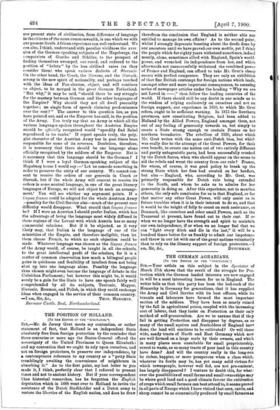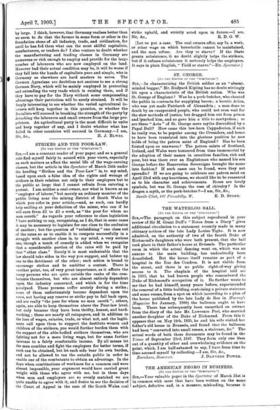THE GERMAN AGRARIANS.
[To THE EDITOR OF THE "SPECTATOR."] SIR,—Your article on this subject in the Spectator of March 17th shows that the result of the struggle for Pro- tection which the German landed interests are now engaged in will be a most interesting lesson for us in England. The writer tells us that this party has been the bed-rock of the Monarchy in Germany for generations, that it has supplied the Army and Civil Service with its best officers, while its tenants and labourers have formed the most important section of the soldiers. They have been so nearly ruined by the fall in agricultural prices, coupled with the increasing cost of labour, that they insist on Protection as their only method of self-preservation. Are we to assume that if they fail in getting Protection and disappear by degrees, as so many of the small squires and ,freeholders of England have done, the land will continue to be cultivated? Or will those wide, sandy tracts of North and East Germany which now are well farmed on a large scale by their owners, and which in many places seem unsuitable for small proprietorship, revert to waste, as so many tracts of poor land in this country have done P And will the country really in the long-run be richer, happier, or more prosperous when a class which, whatever its faults may be, has yet many solid virtues for which townspeople, however well fed, are not pre-eminent, has largely disappeared ? I venture to doubt this, for what- ever the possibilities of small farms and small ownerships may be where good land and a good climate favour the cultivation of crops which small farmers can best attend to, it seems proved in all parts of Europe which I have visited that corn, cattle, and sheep cannot be so economically produced by small farmers as
by large. I think, however, that Germany realises better than we seem to do that the farmer in some form or other is the foundation stone of all industry, trade, and civilisation, for until he has fed them what can the most skilful capitalists, manfacturers, or traders do P I also venture to doubt whether the manufacturing and trading classes in Germany are numerous or rich enough to employ and provide for the large number of labourers who are now employed on the land. However bad their actual condition may be, it will be worse if they fall into the hands of capitalists pure and simple, who in Germany as elsewhere are hard masters to serve. The German Agrarians are doubtless not anxious to see a strong German Navy, which will be mainly employed in protecting and extending the very trade which is ruining them, and if they have to pay for the Navy without some compensating advantage their patriotism will be sorely strained. It will be leeply interesting to see whether the varied agricultural in- :erests will keep together in this question, or whether the Socialists will succeed in breaking the strength of the party by detaching the labourers and small owners from the large pro- prietors. An agricultural party is the most difficult to unite and keep together of any, and I doubt whether what has failed in other countries will succeed in Germany.—I am,







































 Previous page
Previous page